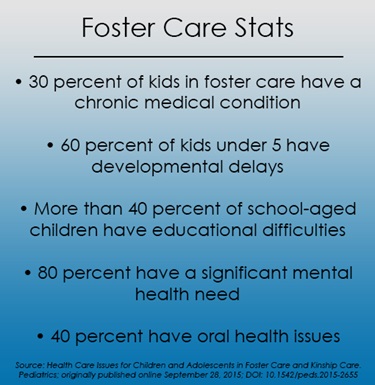It was a chilly November afternoon in 2017 and then 16-year-old Unique once again found herself in the Emergency Department at Children’s Wisconsin. In fact, over the last few years of her life, Unique was going to the Emergency Department once or twice a month.
Just a few hours earlier, Unique was riding her bike around her neighborhood when she suddenly struggled to breathe. She had battled severe asthma her entire life and she knew she shouldn’t be exerting herself like that. But as teenagers do, she didn’t always heed those instructions.
Unique actually didn’t mind the hospital so much. She had been there so often that it began to feel a bit like home. It was comfortable. People cared for her. They brought her food. She could watch all the TV she wanted.
Suddenly a woman she had never seen before appeared in her doorway. “Hi, I’m Tricia Blum,” the woman said. “I’m your Care4Kids outreach coordinator.”
Wisconsin’s Care4Kids Foster Care Medical Home is a voluntary Medicaid program operated and administered by Children’s Wisconsin and Children’s Community Health Plan that is designed to ensure children in “out of home care” have their health needs met. Through a team of professionals who coordinate care and build relationships between the child, their caregivers and medical providers, Care4Kids helps kids in foster care receive consistent care. In short, the program creates a “medical home” for these kids.
An innovative approach to wellness
It is the vision of Children’s Wisconsin for the kids of our state to be the healthiest in the nation — and that bold aspiration includes kids in foster care. Children in foster care are especially vulnerable and face many unique health challenges. The trauma of instability early in life can have untold physical, mental and behavioral consequences later.
“Many people hear of Children’s and immediately think of our phenomenal hospital-based services,” said Michael Boeder, director of Care4Kids for Children’s Community Health Plan. “But this program demonstrates how Children’s Wisconsin, with the support of many community partners, is focused on improving the health of all kids in the state, especially the most vulnerable. Care4Kids is in direct alignment with our organizations core values.”
Around 30 percent of kids in foster care have a chronic medical condition. For kids younger than 5, 60 percent have developmental health issues. More than 40 percent of school-aged children have educational difficulties. Up to 80 percent have a significant mental health need and nearly 40 percent have significant oral health issues. Overall, kids in foster care are prescribed psychotropic medications at a rate 3 times that of other children enrolled in Medicaid
To help combat this, Care4Kids was launched in 2014. This innovative program is a partnership between Children’s Wisconsin and the Wisconsin Department of Children and Families and Department of Health Services that aims to provide children in foster care with access to stable and reliable health care, including medical, acute, behavioral, vision and dental services.
 “This is a unique population of kids who often have complex needs that are involved in a complicated system of care,” said Boeder. “Our job is to untangle all of that and organize the information to ensure that these kids’ needs are understood and met.”
“This is a unique population of kids who often have complex needs that are involved in a complicated system of care,” said Boeder. “Our job is to untangle all of that and organize the information to ensure that these kids’ needs are understood and met.”
Care4Kids coordinates multiple systems, including county child welfare, state child welfare and medical providers, behavioral health providers and caregivers, foster parents, biological families and school systems. The goal is to keep the focus on the health and well-being of the kids.
When a child is placed in the program, within two days they’ll receive an Out of Home Health Care Screen and within 30 days they’ll receive an Initial Comprehensive Health Exam (ICHE) with a primary care provider specially trained in trauma informed principles. They’ll be assigned a Care4Kids outreach coordinator and health care coordinator who work closely with the child’s assigned child welfare team, the primary care provider, any specialty providers, the child’s caregivers and legal guardians to create a care plan tailored to that child’s individual needs.
Care4Kids currently serves kids in the six county metro Milwaukee area: Milwaukee, Racine, Kenosha, Ozaukee, Washington and Waukesha. In that relatively small geographical footprint, Care4Kids manages approximately 3,200 of the 7,700 children in foster care in Wisconsin.
To meet those needs, Care4Kids has a large, diverse staff, including three intake coordinators, 30 outreach coordinators and 15 registered nurses or advanced practice social workers. Care4Kids also has an internal assessment team consisting of a physical therapist, an occupational therapist, a speech/language pathologist and a behavioral health therapist who evaluate the children’s needs when they enter the program and identify ongoing developmental or mental health needs if appropriate.
The positive outcomes have been impressive. For kids enrolled in Care4Kids, from 2014 to 2017:
- Inpatient admission declined from 234.9 per 1,000 to 112.5.
- Emergency Department visits dropped from 1,015.4 per 1,000 to 801.4.
- Childhood immunizations increased from 92 percent to 98 percent.
- Adolescent immunizations increased from 94 percent to 99 percent.
- Developmental and mental health screenings increased from 37 percent to 93 percent.
- Mental health assessments jumped from 31 percent to 79 percent.
- 82.6 percent of children saw a dental professional in 2017.
“Improving the health of this population is our primary goal, and we have seen significant improvements in outcomes since we started in 2014. What’s interesting is we have seen a reduction in certain health care expenditures, as well,” said Boeder. “For example, we have seen a 19 percent reduction in overall medical costs for our population. That’s nearly $13 million in savings for Wisconsin. We think that clearly demonstrates the value of care coordination.”
A unique relationship
 Thanks in large part to her relationship with Tricia, Unique has made great strides since joining Care4Kids.
Thanks in large part to her relationship with Tricia, Unique has made great strides since joining Care4Kids.
Unique is one out of 110 kids whose care Tricia currently manages. Every kids’ needs are different and Tricia knows how to manage them accordingly.
“I don’t have relationships with the other kids I work with like I do with her. I have good relationships, but they just need little check-ins,” said Blum. “With Unique, she is in a special situation and has additional needs. I’m trying to support her and help her learn to be responsible for herself.”
Tricia will call Unique every day to remind her to take her medication. One time Unique had an infection and was prescribed an antibiotic. The infection wasn’t going away and Tricia figured out that Unique wasn’t taking the medicine correctly, so she sat down with her and walked her through it: “This is how you take the medicine. This is when you need to take it. Do we need to set up a reminder? Let’s call and make an appointment.”
In the year before Unique enrolled in Care4Kids and got connected with Tricia, she visited the Children’s Wisconsin Emergency Department 12 times for her asthma. In the year since, she’s only gone once.
“It is the focus of Children’s Wisconsin for all kids in Wisconsin to be the healthiest in the nation and that includes kids who are enrolled in Care4Kids,” said Boeder. “Unique’s ability to maintain her asthma treatment plan and not require emergency medical support is an amazing indication of how her relationship with Tricia has impacted her health in a very positive way.”
Aside from the daily medication reminders and drives to and from doctor appointments, many times Tricia and Unique will just get together to talk and eat a meal together. Unique is every bit your typical 17-year-old girl. She likes to go shopping, eat out and spend time on her phone. Her life has often lacked stability and because of that it can take her a little time to warm up to new people. But talk to her for just a few minutes and that warm soul underneath can’t help but crack through.
For the longest time, Unique didn’t understand why Tricia cared. She’d always ask, “Why do you do this? Why do you call me? Why do you want me to go to the doctor?” She simply hadn’t experienced that caring adult presence very often.
Children crave stability. They thrive in it. And for large stretches of her life, Unique didn’t have it. But for the last year of her life Tricia has been that steady presence. She always answers the phone when Unique calls. She’s always there when Unique needs her. And that companionship, perhaps as much as any medication or doctor visit, has been a blessing for Unique’s health and well-being.







